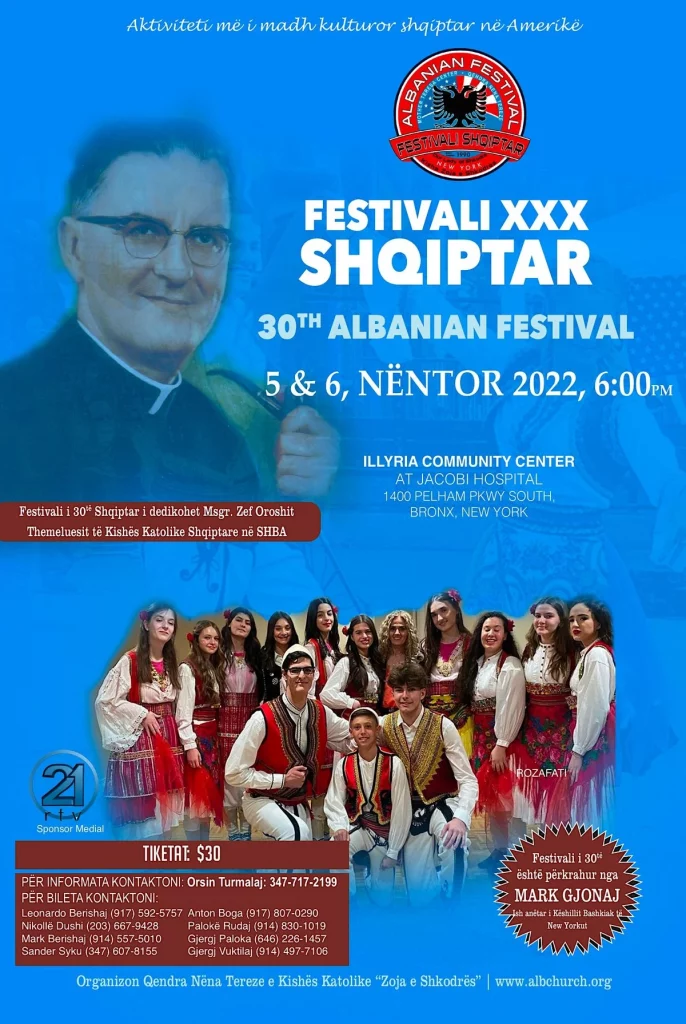
Rafaela Prifti/
A welcomed annual celebration of the Albanian folk music and dance that started in 1990 and was interrupted by the pandemic for two years made its comeback at the Illyria Community Center auditorium on November 5 and 6th. The Albanian Festival goes back three decades when Our Lady of Shkodra Church (Kisha Zoja e Shkodres) and Mother Teresa Center (Qendra Nena Tereze) supported by the community launched a performing concept that over the years has become “the largest Albanian American Cultural event in the USA”. The organizers and officials underlined the importance of the venue that was intended to provide such services for the community as stated in its groundbreaking ceremony last year reported by Dielli https://gazetadielli.com/groundbreaking-for-illyria-community-and-wellness-center/
“Tonight’s event reinforces the commitment of this community to come together across religious and regional backgrounds to preserve our tradition as a celebration of who we are as Albanian Americans,” said Mark Gjonaj, former Assembly and former NYC Councilman as well as a leading force of the project. In recognition of another place of significance for the community that serves a high spiritual purpose, NYS Assemblywoman Nathalia Fernandez, honored with citation Our Lady of Shkodra Church. The 30th Albanian Festival paid homage to Monsignor Dr. Professor Zef, founder of the Albanian Catholic League and the First Catholic Church in America. “His relentless work and message of humanity resonate with us,” said pastor Dom Pjeter Popaj of our Lady Of Shkodra, who gave a brief summary of late Monsignor Zef Oroshi. founder of the Church (then Our Lady of Good Council), a theologian and intellectual of immense stature. The 2022 Festival coincides with the 110 anniversary of his birth year.
“What’s special about this year’s Festival is that it is passed down from one generation to the next,” said Gezim Nikaj, Artistic Director, who has been involved with the event since the 1990s. His wife, Angjelina Nika, recipient of Grand Master title, choreographer of the Rozafati Dance Group, is talking to some students before the show as we try to ask her some questions. She has been doing this for so long and successfully, says Artistic Director Gezim Nikaj, that “her students have become mothers and they now bring their kids to their teacher.” The sentiment is shared by parents like Mark Lumaj of Vermosh sitting in the auditorium next to his family members. While holding his toddler, Mark says that he “can’t wait for his son to be joining the groups on stage as soon as next year.” It worth-noting the parallels of the generational work that the church, organizations and cultural centers have engaged and have dedicated their services since their founding. In that context, it is quite fitting that Gezim Nikaj also a Grand Master became recently the Chairman of the Hudson Valley Branch of Pan-Albanian Federation of America Vatra. Senior Vatra members like Nazo Veliu, Vatra Secretary, Adrian Leka etc were cheering on the performers and supporting the event. Tonin Mirakaj, Vatra veteran, who has a lot of memories from late Monsignor Zef Oroshi, was present and engaged with the initiative that developed into a full fledged event. In this context, the Festival itself represents a tradition designed to preserve and pass down our celebrated heritage of Albanian folk culture and ethnic identity.
This enormous task and responsibility are carried out diligently by the members of organizing committee: Pastor Dom Pjeter Popaj, Chairman of Church Council Nikolle Grishaj, Director of Nena Tereze Mark Berishaj, Festival Director Orsin Turmalaj, Artistic Director and Festival Director Gezim Nikaj and Agim Kola, MC Besjana Ponari and Zef Vataj, Advertising Coordinators Lule Gjokaj, Margarita Gazivoda, Age Ivezaj, and the Kastrioit Orchestra led by Dritan Papa.
The performing groups include dancers of Rozafati group, Nora e Kelmendit (Nora of Kelmendi), Gjergj Kastrioti, Barbana, Kelmendi ensemble, singers Besim Muriqi, Haki Krasniqi, Idriz Hulaj, rhapsody group National Unity (Bashkimi Kombetar), Edmond Nikolla, Maria Lajcaj, Mikeila Nonaj, Hajro Ceka, Nik Carku, Enjela Qema, Dionis Delia, Mimoza Gjikola, Lap Logu, Nora Ernesti, Vida Kunora, and a theatre performance by Hope of Albanians (Shpresa e Shqiptareve).
Tradition and history are weaved together on stage in a tapestry of colors, sounds and movements of Albanians groups of folk dancers and singers of all ages for two-night Festival on November 5 and 6. Two teenage performers dressed in costumes of Southern Albania region were making last minute preparations when I approached them to ask how they were feeling before the performance of the first night. Despite being born here Nora Balidemaj and Kathrin Gjuraj tell me that they are respectively from Shkodra and Plave Guci. Nora and Kathrin, both dancers of Rozafati group, say that after the hiatus of two years, “we are excited to come back to the Festival and do the performance on stage.”
Festival Director Orsin Turmalaj understands the excitement surrounding the event this year. He recalls that in 2019 the event was dedicated to the icon of Albania’s Independence Ismail Qemali. “It is a time-honored feature,” says Orsin, who has been involved with the event since 2005. The venue for the 29th Festival was the Lehman Center for the Performing Arts. The late editor of Dielli Dalip Greca covered the 2019 event where the honorees were former Festival Director Frank Çota and Fran Shala. At the 2022 Albanian Festival, sitting at the center row are the Çotas and their daughter’s family. They “are delighted to be part of this generational event,” and will come back next year “to cheer on their toddler grandson on stage.”
Looking around the auditorium at the cheerful faces of parents, grandparents, older and younger siblings, teachers, representatives of organizations and supporters from all walks of life, the return of the Albanian Festival for two nights at the Illyria Community Center is a landmark event welcomed by all. Festival is itself a representation of a tradition that is perpetuated for three decades in celebration of the Albanian heritage and rich cultural identity.